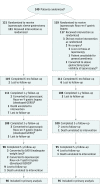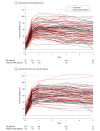Effect of Laparoscopic Sleeve Gastrectomy vs Laparoscopic Roux-en-Y Gastric Bypass on Weight Loss at 5 Years Among Patients With Morbid Obesity: The SLEEVEPASS Randomized Clinical Trial
- PMID: 29340676
- PMCID: PMC5833550
- DOI: 10.1001/jama.2017.20313
Effect of Laparoscopic Sleeve Gastrectomy vs Laparoscopic Roux-en-Y Gastric Bypass on Weight Loss at 5 Years Among Patients With Morbid Obesity: The SLEEVEPASS Randomized Clinical Trial
Abstract
Importance: Laparoscopic sleeve gastrectomy for treatment of morbid obesity has increased substantially despite the lack of long-term results compared with laparoscopic Roux-en-Y gastric bypass.
Objective: To determine whether laparoscopic sleeve gastrectomy and laparoscopic Roux-en-Y gastric bypass are equivalent for weight loss at 5 years in patients with morbid obesity.
Design, setting, and participants: The Sleeve vs Bypass (SLEEVEPASS) multicenter, multisurgeon, open-label, randomized clinical equivalence trial was conducted from March 2008 until June 2010 in Finland. The trial enrolled 240 morbidly obese patients aged 18 to 60 years, who were randomly assigned to sleeve gastrectomy or gastric bypass with a 5-year follow-up period (last follow-up, October 14, 2015).
Interventions: Laparoscopic sleeve gastrectomy (n = 121) or laparoscopic Roux-en-Y gastric bypass (n = 119).
Main outcomes and measures: The primary end point was weight loss evaluated by percentage excess weight loss. Prespecified equivalence margins for the clinical significance of weight loss differences between gastric bypass and sleeve gastrectomy were -9% to +9% excess weight loss. Secondary end points included resolution of comorbidities, improvement of quality of life (QOL), all adverse events (overall morbidity), and mortality.
Results: Among 240 patients randomized (mean age, 48 [SD, 9] years; mean baseline body mass index, 45.9, [SD, 6.0]; 69.6% women), 80.4% completed the 5-year follow-up. At baseline, 42.1% had type 2 diabetes, 34.6% dyslipidemia, and 70.8% hypertension. The estimated mean percentage excess weight loss at 5 years was 49% (95% CI, 45%-52%) after sleeve gastrectomy and 57% (95% CI, 53%-61%) after gastric bypass (difference, 8.2 percentage units [95% CI, 3.2%-13.2%], higher in the gastric bypass group) and did not meet criteria for equivalence. Complete or partial remission of type 2 diabetes was seen in 37% (n = 15/41) after sleeve gastrectomy and in 45% (n = 18/40) after gastric bypass (P > .99). Medication for dyslipidemia was discontinued in 47% (n = 14/30) after sleeve gastrectomy and 60% (n = 24/40) after gastric bypass (P = .15) and for hypertension in 29% (n = 20/68) and 51% (n = 37/73) (P = .02), respectively. There was no statistically significant difference in QOL between groups (P = .85) and no treatment-related mortality. At 5 years the overall morbidity rate was 19% (n = 23) for sleeve gastrectomy and 26% (n = 31) for gastric bypass (P = .19).
Conclusions and relevance: Among patients with morbid obesity, use of laparoscopic sleeve gastrectomy compared with use of laparoscopic Roux-en-Y gastric bypass did not meet criteria for equivalence in terms of percentage excess weight loss at 5 years. Although gastric bypass compared with sleeve gastrectomy was associated with greater percentage excess weight loss at 5 years, the difference was not statistically significant, based on the prespecified equivalence margins.
Trial registration: clinicaltrials.gov Identifier: NCT00793143.
Conflict of interest statement
Figures




Comment in
-
Comparing the Outcomes of Sleeve Gastrectomy and Roux-en-Y Gastric Bypass for Severe Obesity.JAMA. 2018 Jan 16;319(3):235-237. doi: 10.1001/jama.2017.20449. JAMA. 2018. PMID: 29340659 No abstract available.
-
Reimagining Obesity in 2018: A JAMA Theme Issue on Obesity.JAMA. 2018 Jan 16;319(3):238-240. doi: 10.1001/jama.2017.21779. JAMA. 2018. PMID: 29340660 No abstract available.
-
Mid-term results of laparoscopic Roux-en-Y gastric bypass and laparoscopic sleeve gastrectomy compared-results of the SLEEVEPASS and SM-BOSS trials.Ann Transl Med. 2018 Nov;6(Suppl 1):S83. doi: 10.21037/atm.2018.10.70. Ann Transl Med. 2018. PMID: 30613658 Free PMC article. No abstract available.
References
-
- Helmiö M, Victorzon M, Ovaska J, et al. . SLEEVEPASS: a randomized prospective multicenter study comparing laparoscopic sleeve gastrectomy and gastric bypass in the treatment of morbid obesity: preliminary results. Surg Endosc. 2012;26(9):2521-2526. - PubMed
-
- Helmiö M, Victorzon M, Ovaska J, et al. . Comparison of short-term outcome of laparoscopic sleeve gastrectomy and gastric bypass in the treatment of morbid obesity: a prospective randomized controlled multicenter SLEEVEPASS study with 6-month follow-up. Scand J Surg. 2014;103(3):175-181. - PubMed
-
- Brethauer SA, Kim J, El Chaar M, et al. ; ASMBS Clinical Issues Committee . Standardized outcomes reporting in metabolic and bariatric surgery. Obes Surg. 2015;25(4):587-606. - PubMed
Publication types
MeSH terms
Associated data
LinkOut - more resources
Full Text Sources
Other Literature Sources
Medical
Research Materials

